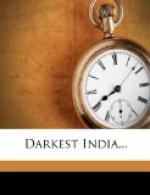Then Dr. Farrar quoted the late Bishop Lightfoot and the late Canon Liddon in favor of The Salvation Army as an organisation which had accomplished a deal of good work.
Next he asked, “How shall we receive General Booth’s scheme now that it is here to our hands?” With some people the simplest way of treating any scheme for good was to leave it alone. To those who took that position with reference to General Booth’s scheme he had nothing whatever to say. There was no need for saying anything either to the other class of people who would talk about a scheme, and having talked about it drop the matter and think no more about it.
Another way in which General Booth’s scheme might be received was that of examining it, and if convinced against it of rejecting it. That, at all events, was a perfectly manly course; a clear and decided method of reception which there can be no mistaking. To those included in this class, those who would regard the scheme as migratory or pernicious, there was nothing to be said. But what about those who did not mean to help in this or any other scheme, those who left others the burden of the work, the opportunists who would want to step in when the breach had been made? Here, no doubt, there would be such a class, but the last way of receiving General Booth’s scheme, and the way in which as he trusted it would be received, was to support it by their influence, and to give to it of their means. It was an immense and far-reaching scheme, which, might bring help and hope to thousands of the helpless and hopeless, made helpless and hopeless by the terrible conditions of society, but for every one of whom Christ died.
To begin the scheme in earnest would require a sum of L100,000, but he asked, “What was that to the wealth of England—to the wealth of London?” It was a mere drop in the ocean compared to what was every year spent on drink and wasted in extravagance. There were a hundred men in England who might immortalise themselves by giving this sum, and yet not have a luxury the less. He left the response to General Booth’s appeal with the public, but would it not, he asked, be a desperate shame for England if any scheme giving so hopeful a promise of social amelioration should fail without a trial, and like a broken promise, be lost in air?
But to this observation somebody might reply in the form of a queried objection, “The scheme might fail.” Yes, it might fail; anything might fail. But if to die amid disloyalty and hatred meant failure, then St. Paul failed. If to die in the storm meant failure, then Luther and Wesley and Whitfield failed; if to die at the stake by the flames meant failure, did not martyrs fail; Finally, if to die on the cross, with the priests and the soldiers spitting out hatred, meant failure, then Jesus Christ failed. Yes, the scheme might fail; but was all this failure? Were there none among them bold enough to look beyond the possibility of failure?




